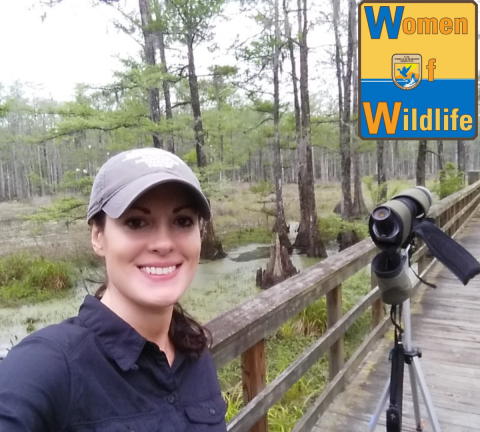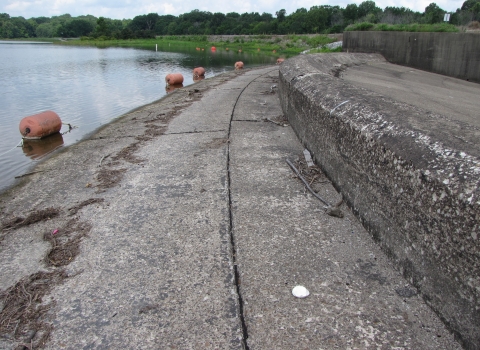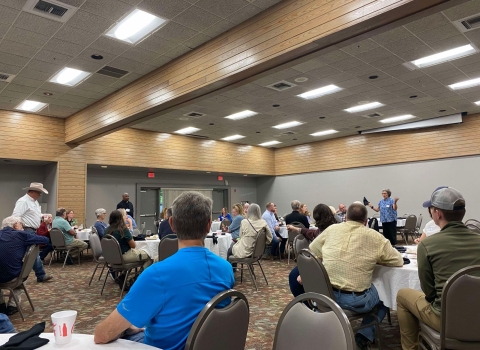In the middle of March Madness, basketball coaches are doing all they can to keep their teams strong, healthy and encouraged throughout the month, all with the aim of winning as many games as possible.
When it comes to conservation, it’s not a game. It’s a way of life for Morgan Wolf who lives and works in South Carolina.
“My role in helping improve the health of species in the wild ensures that future generations get to experience a country that still has them in it. Each animal has a role to play in our environment and deserves to be protected from harm,” says the U.S. Fish and Wildlife biologist who helps recover two endangered species.
In this role, she is basically the offensive and defensive coordinator for the Carolina heelsplitter and the Eastern black rail.
While she may be coordinating the effort to improve habitats and population numbers for each endangered species, she’s not alone. Wolf works with a talented team, all of whom are equally committed to the end goal.
“I work with partners to conserve, protect and enhance fish, and wildlife populations and their habitats for the continuing benefit of the American people,” says Wolf who hails from Williamsburg, Ohio, near the Ohio River. “None of the conservation or restoration work we do can be done without partnerships, both within and especially outside the Service.”
For example, a unique collaboration that spans across the Palmetto State, through the Peach Tree City of Atlanta, and up to the nation’s capital comes together in the Rose City of Lancaster, South Carolina. The winning team there made up of city, county, and state players partner with Wolf and the U.S. Fish and Wildlife Service to make life better for residents in Lancaster and the fresh-water mussel found there.
Found only in the Carolinas, the Carolina heelsplitter has been listed as endangered since 1993. Wolf and partners’ efforts are working to improve the population in Lancaster and other areas of South Carolina where the mussel burrows in creeks and streams.
Thanks to the recent replacement of dated culverts with state-of-the-art natural bottom facilities, residents and heelsplitters are thriving. Before the Service-county-city winning team started working together, roads flooded; residents would be stranded, and heelsplitters would wash away or become buried by road debris and sediment during severe weather events.
“It is important for the public to know that everything I do; everything our agency does; and everything we do with our partners is ultimately for their benefit,” says Wolf, who graduated from Miami University of Ohio with both her undergraduate and graduate degrees.
She explains that conservation is a bit like a caregiver putting clean sheets on a child’s bed.
“You probably didnʻt notice that they were dirty, nor the hard work that went into cleaning them, but boy did it make you feel good at the end of the day.”
“It feels good to know that my efforts each day help move the needle on species recovery, and that my toddler son will get to experience the unique beauty of our country in some small part due to my efforts.”
Wolf joined the Service as an intern with the Student Conservation Association when finishing her master’s degree in environmental science with a conservation biology focus in 2008. She says she chose to work with the Service because its mission and professional culture matched her goals for a “purpose-driven” career.
“There were multiple opportunities [within the Service] to directly contribute to species conservation, and the work was largely hands-on,” Wolf says.
She notes that while she and many colleagues may first gravitate to this work due to the wildlife aspect, there is more to it.
“I would recommend those considering the Service think about the importance of human connection to conservation,” says Wolf, a coach-like figure who assembled a team of partners to ensure the Carolina Heelsplitter comes out victorious every season, all year long, year after year. “Partnerships are key to everything we do as an agency, and interactions with the public are commonplace and important to our mission.”
Editor’s note: During Women’s History Month, the U.S. Fish and Wildlife Service celebrates the accomplishments and commitment of women throughout the organization. The Women of Wildlife, or WOW, story series highlights some of the women serving in the Southeast Region.






